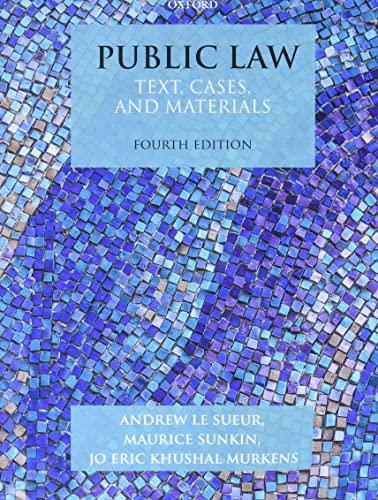Question
The Hogtown Licensing Commission is an agency of the city of Hogtown. Under the municipal business licensing by-law, the commission regulates the taxicab industry by
The Hogtown Licensing Commission is an agency of the city of Hogtown. Under the municipal business
licensing by-law, the commission regulates the taxicab industry by issuing licences to own and drive
taxis, setting standards, and holding hearings regarding the suspension or revocation of the licences
of taxi owners and drivers.
Mr W owns and drives a taxi. Two months ago, he drove a woman from her home to her doctor's
office. The following day, she complained to the commission that Mr W made sexual advances toward
her. After investigating, the commission proposed to revoke Mr W's licence to drive a taxi.
At the hearing subsequently held by the commissioner, the commission staff attempt to introduce
evidence of three previous infractions of standards in support of their request to revoke the licence.
Mr W's representative challenges the admissibility of this evidence. The evidence that the
commission staff want to introduce is as follows:
Seven years ago, a passenger complained that Mr W used profane language while driving
her to a hairdressing appointment. The evidence consists of an inspector's report in Mr W's
file, stating that the inspector interviewed both the passenger and Mr W, and that Mr W
denied the allegations. The file also contains a letter from the passenger setting out her
complaint. The commission staff intend to call the inspector as a witness, but not the
complainant.
Five years ago, a taxi owned and driven by Mr W had a broken trunk door, causing
discomfort and inconvenience to a group of passengers. The evidence consists of an
inspector's report found in Mr W's file. According to the report, the inspector received a
complaint from a passenger stating that, because the trunk would not open, the passenger
could not put his luggage in the trunk and had to put it in the back seat, crowding himself
and another passenger. There is no written or signed statement from the passenger, and no
evidence that anyone from the commission inspected the vehicle, notified Mr W of the
complaint, or took any disciplinary action. The commission staff do not intend to call the
inspector or the complainant to testify.
Three years ago, Mr W allowed another driver to drive a taxi he owned when the brakes
were worn and needed replacing. The evidence consists of a report prepared and signed by
a mechanic employed by the commission to carry out safety checks on taxis, stating that she
inspected the vehicle and found that the brakes were worn to the point that it was
dangerous to operate the vehicle.
1. Is any of this evidence admissible? Why, or why not?
2. If the evidence is admissible, what considerations should the commission take into account in
deciding what weight it should be given?
Step by Step Solution
There are 3 Steps involved in it
Step: 1

Get Instant Access to Expert-Tailored Solutions
See step-by-step solutions with expert insights and AI powered tools for academic success
Step: 2

Step: 3

Ace Your Homework with AI
Get the answers you need in no time with our AI-driven, step-by-step assistance
Get Started


